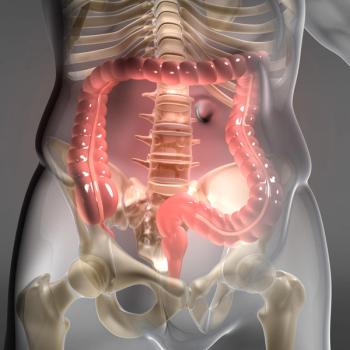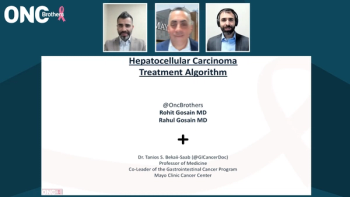
Gastrointestinal Cancer
Latest News
Latest Videos

CME Content
More News

Sacituzumab tirumotecan elicited responses prominently in the second- and third-line and beyond setting and in those with high TROP2 expression.

Experts discuss findings related to gastrointestinal cancer outcomes as well as treatment inequalities presented at the 2024 SSO Annual Meeting.

In-hospital mortality and complication rates were lower at accredited hospitals vs those not accredited for patients undergoing rectal cancer surgery.

Data from the phase 1/2 KRYSTAL-1 trial may support adagrasib plus cetuximab as a new standard in previously treated metastatic KRAS G12C–mutated CRC.

The pilot trial is planning to enroll 20 patients who are deemed inoperable but do not have metastatic disease.

The liquid biopsy combining miRNA and CA19-9 had the best validation rates for detecting pancreatic ductal adenocarcinoma.

Tailoring neoadjuvant therapy regimens for patients with mismatch repair deficient gastroesophageal cancer represents a future step in terms of research.

The PREEMPT trial analyzed samples from 27,010 average-risk adults to determine the specificity of detecting colorectal cancer.

Not much is currently known about the factors that may predict pathologic responses to neoadjuvant immunotherapy in this population, says Adrienne Bruce Shannon, MD.

The toxicity profile of tislelizumab also appears to look better compared with chemotherapy in metastatic esophageal squamous cell carcinoma.

Patients with unresectable or metastatic esophageal squamous cell carcinoma and higher PD-L1 expression may benefit from treatment with tislelizumab, according to Syma Iqbal, MD.

Quantifying disease volume to help identify potential recurrence following surgery may be a helpful advance, according to Sean Dineen, MD.

If possible, targeting the BER pathway for drug sensitivities may increase therapeutic options for managing solid cancers, wrote Channing Paller, MD.

Long-term circulating tumor DNA responses appear to align with progression-free survival trends in a phase 2/3 trial of the GRANITE vaccine in those with microsatellite-stable colorectal cancer.

Tanios S. Bekaii-Saab, MD, discusses safety profile considerations for patients undergoing treatment for hepatocellular carcinoma, and the Oncology Brothers recap the entire discussion.

Turning the focus to advanced-stage HCC, Tanios S. Bekaii-Saab, MD, offers comprehensive insights on first- and second-line treatment options.

Medical oncologists outline localized therapy options for patients with early- and intermediate-stage hepatocellular carcinoma.

Tanios S. Bekaii-Saab, MD, joins Rahul Gosain, MD, and Rohit Gosain, MD, to discuss treatment practices for early- and intermediate-stage hepatocellular carcinoma.

Gut microbiome signatures may lead the way for more accurate treatments and diagnoses for patients with colorectal cancer.

Adrienne Bruce Shannon, MD, discussed ways to improve treatment and surgical outcomes for patients with dMMR gastroesophageal cancer.

Patient-reported symptoms following surgery appear to improve with the use of perioperative telemonitoring, says Kelly M. Mahuron, MD.

Findings from the phase 3 CheckMate 649 trial support nivolumab plus chemotherapy as a standard frontline therapy for patients with gastric, gastroesophageal junction, and esophageal adenocarcinoma.

Jun Gong, MD, and Daneng Li, MD, discussed the most impactful trials coming from 2024 ASCO GI.

Jun Gong, MD, and Daneng Li, MD, spoke about trials they feel can impact the gastrointestinal space during a CancerNetwork® X Space.

Over half of the patients with HER2-negative gastric or gastroesophageal junction adenocarcinoma achieve a major pathological complete response following treatment with sintilimab plus FLOT in a phase 2 trial.













































